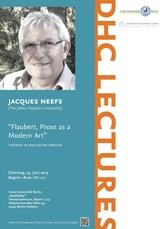 |
Flaubert was certain that he was constructing a modern art of prose. This included the notion that prose works should confront the reader with a new degree of intensity and the appearance of immediate completeness. Narrative prose had to become an attraction emanating from the work itself, issued from the rhythm and the sound of sentences, even from silences. By means of the well-known work of rewriting, erasing, and vocalizing sentences (“gueuloir”), Flaubert submerges himself in his prose so that it becomes both a world and a voice, what he called a “written reality”. An analysis of some texts from Madame Bovary, Salammbô, l’Éducation sentimentale, Bouvard et Pécuchet, based on the manuscript drafts, allows us to clarify the type of intensity that Flaubert sought in creating this “written reality”, and to situate Flaubert’s prose in longer history of aesthetic modernity, which includes Baudelaire, Mallarmé, Courbet, Manet, Cézanne.
|